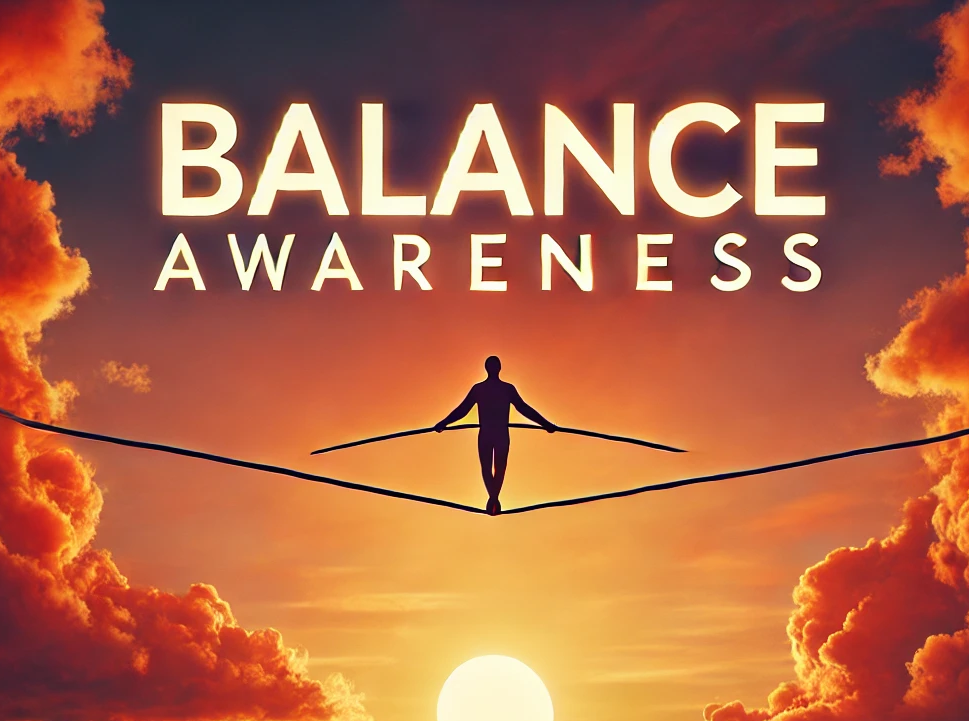Did you know that being too aware of thoughts can lead to overthinking? Finding the right balance between awareness and action is essential. Balancing awareness helps individuals make better decisions and can lead to personal growth. It’s more than just mindfulness; it’s understanding how thoughts and feelings impact daily choices and relationships.
In today’s complex world, knowing how to manage awareness is critical. It affects emotional well-being and decision-making. With constant distractions, people often struggle to maintain focus on what truly matters.
This piece will explore practical strategies for achieving a healthy balance between awareness and action, ultimately enhancing overall life satisfaction.
Key Takeaways
- Balancing awareness improves decision-making and emotional health.
- Practical strategies can help navigate daily choices with clarity.
- Developing self-awareness is crucial for personal growth and well-being.
Understanding Balancing Awareness

Balancing awareness involves recognizing one’s thoughts and emotions while managing them effectively. It can lead to better decisions and a calmer mind. The following sections explore essential aspects of this concept, focusing on self-awareness and mental clarity.
Define Balancing Awareness
Balancing awareness means managing self-awareness and reality without becoming overwhelmed. It is about understanding thoughts and feelings while not letting them control decisions. This balance helps individuals recognize their strengths and weaknesses.
For instance, someone may feel anxious about an upcoming presentation. By balancing awareness, they acknowledge this anxiety but dont let it prevent them from preparing. Instead, they can channel that awareness into action, improving their confidence and readiness.
Self-Awareness and Emotional Stability
Self-awareness is the ability to understand one’s emotions and reactions. This awareness helps improve emotional stability. When individuals recognize their feelings, they can respond calmly instead of reacting impulsively.
For example, when someone receives feedback, self-awareness allows them to process their feelings without becoming defensive. This leads to constructive conversations and personal growth. Emotional stability also means being able to calm oneself during stressful times, contributing to better decisions.
Mindful Thinking and Effective Decision-Making
Mindful thinking is the practice of staying present and aware of thoughts without judgment. This practice enhances decision-making skills. When individuals think mindfully, they can evaluate choices more clearly.
Consider someone faced with a tough choice between two job offers. By practicing mindful thinking, they can weigh the pros and cons without distractions. This focus leads to better decisions that align with their values and goals.
Mental Clarity as Key to Life Decisions
Mental clarity means having a clear understanding of thoughts and feelings. It is essential for making informed life decisions. A cluttered mind can lead to confusion and poor choices.
To improve mental clarity, individuals can engage in practices like journaling or meditation. For instance, journaling can help someone process their thoughts about a significant life change. With a clearer mind, they can approach decisions with confidence and purpose.

This section explores specific aspects of awareness and how they enhance decision-making skills.
Self-Awareness Reduces Impulsivity
Self-awareness allows individuals to recognize their emotions and reactions. This recognition can prevent impulsive decisions that might lead to negative outcomes. For example, when someone feels angry or stressed, they can take a moment to pause before acting.
Practical steps to improve self-awareness include:
- Journaling: Writing daily about feelings can help clarify thoughts.
- Reflection: Regularly asking, “What am I feeling right now?” encourages mindfulness.
- Feedback: Seeking input from trusted friends provides outside perspectives.
By practicing these methods, people can respond to situations more thoughtfully and less reactively.
Balanced Decision-Making for Personal Growth
Key strategies include:
- Weighing Options: Listing pros and cons improves clarity.
- Future Thinking: Visualizing possible outcomes helps refine choices.
- Time Management: Allowing time to consider options prevents rushed decisions.
A balanced approach opens up avenues for growth and satisfaction, aligning decisions with personal values and goals.

Mindful Thinking’s Impact on Emotional Stability
Mindful thinking emphasizes staying present and aware. This practice improves emotional stability, making it easier to navigate challenges. When individuals understand their emotions, they can handle stress better during decision-making.
Suggestions for enhancing mindful thinking include:
- Breathing Exercises: Deep, controlled breaths help center the mind.
- Meditation: Regular meditation promotes awareness of thoughts and feelings.
- Grounding Techniques: Focusing on the environment encourages presence in the moment.
These methods can reduce anxiety and lead to healthier, more balanced decisions.
Balancing Awareness Improves Decision Making
Balancing awareness is about recognizing both internal feelings and external circumstances. This holistic view leads to better decision-making. For instance, during a team project, understanding team members’ emotions can enhance collaboration and productivity.
To cultivate this balance, one can:
- Practice Empathy: Trying to see situations from another’s perspective enriches understanding.
- Regular Check-Ins: Assessing personal feelings and group dynamics keeps awareness high.
- Setting Intentions: Clarifying goals for conversations leads to more focused interactions.
Employing these strategies fosters a deeper connection to self and others, resulting in improved decision-making skills.
Practical Ways to Enhance Balancing Awareness

To improve balancing awareness, one should focus on enhancing self-awareness and emotional stability. Daily habits and mental clarity play significant roles in making better life choices.
Improve Self-Awareness for Better Decisions
Improving self-awareness involves recognizing personal strengths and weaknesses. Regular reflection on feelings and actions helps build this skill. One effective method is journaling. Writing daily about thoughts and experiences allows individuals to notice patterns over time.
Using prompts can make journaling easier. Questions like, “What made me happy today?” or “What challenged me?” can guide reflection. As self-awareness deepens, it leads to better life choices. Knowing oneself aids in making decisions that align with personal values.
For instance, before responding to a stressful situation, taking a moment to reflect can prevent hasty reactions. This pause allows for more thoughtful responses, ultimately enhancing emotional stability.
Daily Habits for Mindful Thinking
Daily habits are essential for fostering mindful thinking. Simple practices like meditation and breathing exercises can significantly enhance focus. Setting aside just five to ten minutes each day for mindfulness can lead to lasting benefits.
Incorporating mindful moments into daily routines helps maintain awareness. For example, during meals, focusing entirely on the food can turn an ordinary activity into a mindful practice. Noticing textures and flavors engages the senses and keeps the mind present.
Another helpful habit is practicing gratitude. Each evening, listing three things to be thankful for can shift perspective and reduce stress. This practice can contribute to emotional stability and a positive mindset.
Strengthen Emotional Stability Skills
Developing emotional stability skills is vital for handling life’s ups and downs. One practical way to strengthen these skills is through emotional regulation techniques. For instance, when feeling overwhelmed, practicing deep breathing can help calm the mind and body.
Understanding triggers is also important. By identifying situations that provoke strong emotions, individuals can prepare better responses. This proactive approach reduces the chance of reactive behavior.
Engaging in physical activities has proven advantages too. Exercise releases endorphins, which boost mood. Regular movement, whether through walking or yoga, enhances overall emotional well-being.
Apply Mental Clarity to Major Decisions
Mental clarity is crucial when making significant life decisions. Taking time to gather information and evaluate options can lead to more informed choices. A helpful strategy is the decision-making matrix, where one lists pros and cons for each option.
Another important aspect is seeking advice from trusted friends or mentors. They can provide insights that may be overlooked. This outside perspective can illuminate new angles and reduce feelings of isolation in decision-making.
Lastly, reflecting after making a decision is beneficial. Assessing outcomes and learning from experiences will enhance future decision-making skills. By applying these techniques, individuals can improve their awareness and reach greater emotional balance in their lives.
Conclusion & Next Steps

Balancing awareness plays a crucial role in decision-making, self-reflection, and personal growth. Understanding how to harness self-awareness can lead to better choices and a more fulfilling life. The following sections outline important concepts and actionable strategies to enhance balancing awareness.
Recap Balancing Awareness and Decision-Making
Balancing awareness involves recognizing and managing thoughts, emotions, and actions. This clarity leads to informed decision-making. When individuals focus on their emotions, they can identify stress triggers effectively.
For instance, a student under pressure can benefit from pausing to assess their feelings before choosing to study or take a break. This practice not only improves productivity but also promotes healthy coping strategies. Effective balancing awareness means giving equal attention to emotional and rational aspects of thinking.
Encourage Mindful Thinking and Self-Awareness
Mindfulness practices help cultivate awareness. Techniques such as meditation can sharpen focus and reduce stress. By spending just a few minutes daily in quiet reflection or guided meditation, individuals can improve their emotional clarity.
Strategies for Sustainable Growth and Better Choices
Creating a personalized action plan can foster continuous growth. Setting specific goals helps to track progress. Here are a few practical strategies:
- Set Clear Goals: Identify what needs to improve, such as stress management or better time management.
- Reflect Regularly: Dedicate time each week for reflection. Consider what choices worked and what didnt.
- Seek Feedback: Talk to trusted friends or family about personal insights.
Self-Awareness Can Make Better Decisions
Self-awareness is crucial in guiding choices. When individuals are aware of their strengths and weaknesses, they can make choices that align with their values. This connection fosters confidence in decision-making.
For instance, a person who knows their tendency to procrastinate can set up a system to stay accountable. They may use reminders or progress tracking apps to remain focused on tasks. Building on self-awareness makes it easier to navigate challenges and seize opportunities.
Cultivating awareness empowers individuals to take control of their choices. By practicing mindfulness and reflecting regularly, they can achieve better outcomes.





